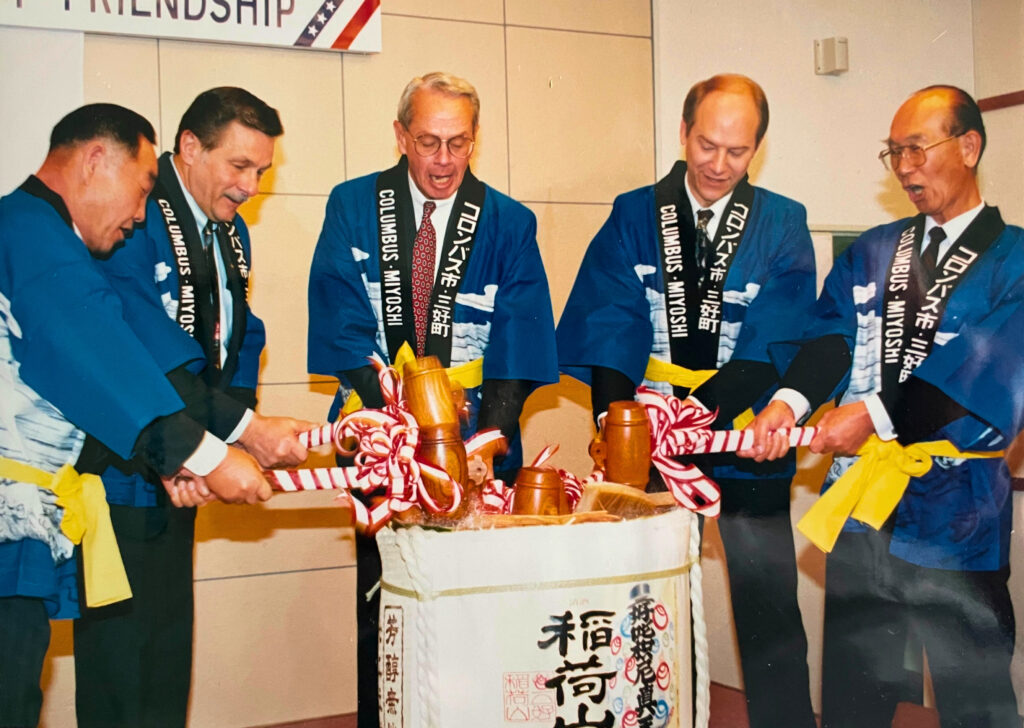
More than 300 cities across the U.S. have a sister city in a different country, and several have multiple sister cities. With global supply chain issues, hiring shortages, and greater trade barriers at the forefront of your mind, you may wonder what sister cities can offer you. In this article, we will delve into a compelling case study of a Japanese business and how its visionary leaders utilized a sister city relationship with a U.S. city to generate over $26 million in annual sales in the North American market.
UNDERSTANDING SISTER CITY RELATIONSHIPS
A sister city, county, or state relationship is a broad-based, long-term partnership between two communities in two countries. A relationship is officially recognized after the highest elected or appointed official from both communities signs off on an agreement to become sister cities (Sister Cities International).
Small and medium-sized enterprises (SMEs) need to internationalize to grow. While they may experience success domestically, their potential is limited by the size of the local market. Diversifying their customer base and supply chain can also help to weather changes in the domestic and global economies. Unlike large companies, many SMEs don’t have the resources to conduct extensive market research before expanding into new markets, instead following opportunities and growing only marginally. This is where sister cities come in to play. Sister city relationships can jumpstart business activities, helping SMEs to enter the new market with a level of trust and credibility that can be challenging to achieve on their own.
CASE STUDY: MIYAMA INDUSTRY CO., LTD.
One remarkable example of a business that has successfully leveraged a sister city relationship for international expansion is Miyama Industry Co., Ltd., a leading Japanese manufacturing company specializing in automotive and safety components. Miyama is located in Miyoshi City in Aichi Prefecture, Japan and has grown to over $50 million in annual sales (2021) and nearly 250 employees since its founding in 1969.
The Miyoshi – Columbus Sister City Connection
Behind every great business, there is a visionary leader. For Miyama, that leader is Chairman Dick Yamamoto. Back in the 1980s, Miyama was part of an association of automotive stamping companies in Japan. The association members, including Dick, were interested in learning more about automotive manufacturing in the U.S. They visited several American companies, including Arvin Industries, Inc. in Columbus, Indiana. The experience sparked the idea to expand Miyama to the U.S., an idea that was reinforced as the Japanese economy entered the “Lost Decade”, a period of significant challenges and stagnation starting in the 1990s.
Around that same time, Columbus Mayor Robert Stewart was making frequent trips to Japan to recruit new investment into the community. As Japanese companies started building manufacturing plants in the area, Japanese employees and their families started moving to Columbus. The Japanese community quickly became the third largest ethnic group in the city. Columbus understood the importance of learning about Japanese culture to make the city a more friendly and welcoming place for Japanese residents.
With Dick looking to expand Miyama from Miyoshi to the U.S., and Columbus looking for Japanese cultural exchange, the stars aligned for the two cities to become partners. Mayor Stewart and Miyoshi Mayor Michio Tsukamoto signed the sister city partnership agreement in 1994. Business introductions were made between Dick and community leaders in Columbus. Dick embraced the cultural exchange by forging lifelong friendships with these leaders, organizing family exchanges that formalized into various other programs between Miyoshi and Columbus.
Miyama Establishes CAPCO, LLC
In May 1997, Dick’s dream came true when Miyama established its U.S. subsidiary, CAPCO, LLC. The decision to choose Columbus as the destination was influenced by several factors: Dick’s visit there years earlier with the Japanese stamping association, personal relationships he had developed with Columbus leaders through the sister city relationship, the vast number of other Japanese companies in the area, and the importance of the automotive manufacturing sector to the local economy.
When planning Miyama’s expansion to the U.S., Dick wanted CAPCO to fully incorporate American business culture in its operations. He felt that it would help foster trust and build strong relationships with local stakeholders and employees and as such enhance the company’s reputation and competitiveness in the local market, leading to long-term success and sustainable growth.
While CAPCO operates independently of Miyama, they still collaborate on strategic direction and technology. Miyama utilizes a manufacturing process called die stamping where strips of metal are cut and shaped using specialized dies, or tools. CAPCO relies on Miyama for the specialized dies but does the stamping in its plant in Columbus. Die stamping provides high precision and accuracy and is suitable for high-volume production, as it can rapidly produce large quantities of parts, making it cost-effective for mass manufacturing.
The day-to-day operations of the company are managed by two vice presidents: Doug Lamb, a local resident who helps support overall operations and trains managers, and Jun Hashizume, a Japanese expatriate who has been in Columbus for 20 years. The president, Dan Arnholt, is an American and business leader in Columbus who was introduced to Dick through the sister city relationship and who plays a critical role for CAPCO in helping navigate local permits, licenses, and tax obligations, as well as facilitating important local relationships.
CAPCO has achieved impressive growth. Here are some key statistics and milestones:
- Sales Growth: Achieved $26.65 million in annual sales (2021).
- Job Creation: Created 86 local jobs in Columbus, contributing significantly to the local economy.
- Market Expansion: Reached new customers like KYB (Indiana), TRQSS (Ontario, Canada), Toyota (Kentucky), and Fuel Total Systems (Kentucky) to name a few.
Insights from CAPCO’s Leadership
I spoke to Vice President Jun Hashizume who shared his thoughts on the impact of sister city relationships:
“As a company, our commitment extends beyond profitability; it encompasses the welfare of our team. We have a diverse workforce that is not just limited to American or Japanese culture. Our aim is to foster a positive and inclusive environment for all, mirroring the principles of cooperation and understanding exemplified by sister city relationships.”
Additionally, President Dan Arnholt emphasized the importance of sister city relationships:
“Sister city relationships are extremely important to develop relationships and understanding of ethnic groups that make up your community. A good cohesive work force in a community will strengthen the viability of all manufacturing within that community.”
SISTER CITY SYNERGY
None of this could be done without the support of Miyoshi City and the City of Columbus. Both cities have played pivotal roles in fostering a strong sister city relationship. Miyoshi and Columbus have actively engaged in cultural exchange programs, trade missions, and the sharing of traditions, art, and educational initiatives over the years. This success owes much to the dedication of numerous community leaders in both cities, who have worked to bridge gaps, nurture relationships, and ensure the strength of the international partnership. Miyoshi and Columbus exemplify how cities can actively invest in and leverage sister city relationships for the benefit of their communities.
SISTER CITIES INTERNATIONAL: A CATALYST FOR GLOBAL COLLABORATION
Sister Cities International is a non-profit organization dedicated to promoting sister city relationships worldwide. With a vast network of over 2,000 member communities in more than 140 countries, Sister Cities International is a valuable resource for businesses seeking to tap into the potential of these relationships.
In a conversation with Ricki Garrett, President and CEO of Sister Cities International, who emphasized the organization’s role in fostering international collaborations:
“Historically, sister cities were focused on education and cultural exchanges, but over time they have become a strategic avenue for global trade and investment. We’ve witnessed countless success stories of businesses leveraging these relationships for expansion.”
To assist businesses and cities interested in establishing or enhancing sister city relationships, Sister Cities International offers a range of toolkits covering everything from how to establish a sister city relationship to marketing and fundraising ideas. I got to take a sneak peek at their Economic Development Toolkit, which is slated to hit their website in the coming weeks. The Economic Development Toolkit guides businesses and cities through the development of business ideas, offers best practices for leveraging sister city relationships for economic benefit, and showcases innovative ways cities are connecting.
CONCLUSION
The story of Miyama’s global success exemplifies these key benefits of sister city relationships:
- Economic Opportunities: Columbus made business introductions between Dick and community leaders. These relationships, and the additional commitment of Columbus to invest in a sister city relationship with Miyoshi, were important factors in Miyama’s decision to establish its U.S. subsidiary there. Situated in the Midwest with a strong automotive manufacturing sector, Columbus was a strategic location to acquire new customers.
- Cultural Understanding: Dick supported family exchanges that developed into formal programs between the two cities, such as cultural exchanges and trade delegations. He embraced American culture and wanted CAPCO to fully incorporate local culture and business practices. This has enhanced the company’s reputation and competitiveness in the local market.
- Access to Local Resources: One of the local business leaders Dick was introduced to early in the sister city relationship was Dan Arnholt, who has been president of CAPCO since 2000. While Vice Presidents Doug Lamb and Jun Hashizume manage the day-to-day operations, Dan has played a pivotal role in helping navigate necessary permits, licenses, and tax obligations.
- Networking and Collaboration: Personal relationships developed through the sister city relationship helped Miyama enter the new market with a level of trust and credibility that can be challenging for businesses to achieve on their own.
In summary, businesses and cities can embark on a journey of international growth and cross-border collaboration that benefits both their bottom line and the communities they serve. Sister city relationships are more than just cultural connections; they are bridges to a world of business opportunities waiting to be explored.
A special thanks to Chihoko Jo at Miyoshi City and Nancy Wagner at City of Columbus, as well as the CAPCO team, whose invaluable contributions and unwavering support were instrumental in bringing this article to fruition. Without them, this endeavor would not have been possible.
As someone who grew up in Columbus deeply engaged in the sister city relationship, the author can attest to the impact of this international partnership that played a pivotal role in her founding Teutizoku LLC, a full-service firm that helps locate and develop international business opportunities for companies









More Stories
Sonatus – The industry is shifting gears to software
Cybord warns of dangers of the stability illusion
HERE building trust in ADAS systems